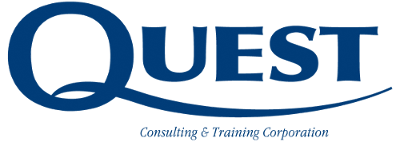Impact On The Organization
Are your individual contributors as engaged and effective as they could be? While they may be technically proficient, are they taking responsibility for their work, looking for opportunities for improvement, working well with their colleagues, and demonstrating good communication and team skills? This program teaches those competencies and provides basic Six Sigma problem solving skills, all with a focus on performance improvement. By making sure your contributors have the skills they need, as well as giving them an opportunity to address an ongoing process issue, they become more engaged in the work and interested in making significant improvements.
Topics Covered
- Behavioral Assessment/Management Assessment
- Communication Essentials
- Dealing with Difficult Situations
- Innovation at Work
- Team Problem Solving I
- Team Problem Solving II
- Team Problem Solving III
- Team Problem Solving IV
Many of the topics covered in this program are accompanied by assessments, and all rely on interactive training techniques. Participants will practice each skill in exercises, simulations, or role plays.
Along the way, participants discover powerful new ways to get involved, communicate more effectively with people of varying communication styles, and resolve a wide range of difficult situations. Working in a team, they also learn to apply Six Sigma problem solving skills to a real, ongoing process issue. At the conclusion, they present their findings to management.
Who Should Take This Course?
The ideal candidate has demonstrated a commitment to their work and doing a good job.
Topics Summaries
Behavioral Assessment / Management Assessment
This module teaches techniques for listening actively, showing respect and appreciation, and soliciting feedback. Participants discover their own DiSC “Workplace” behavioral style, learn how to effectively interact with other styles, and master powerful techniques for motivating others. Through a series of exercises, they learn how these new insights and communication skills can reduce conflict, improve teamwork, and enhance productivity.
Communication Essentials
This module will give participants a clearer understanding of the skills they need to communicate effectively. Participants will assess their specific strengths, identify opportunities for improvement, and practice skills that will make them better communicators. They will learn how to send clearer messages, control non-verbal communication, become effective active listeners, and give and receive feedback more successfully. Participants will be taught tools to improve their weak areas, and develop individual communication action plans to help them make the changes they need to become more successful communicators.
Dealing with Difficult Situations
This module is geared toward helping employees deal with other employees who display difficult behavior, while at the same time gaining insights into themselves and their own behavior. It introduces the Johari Window method for learning more about oneself and others. Participants learn about all four behavior styles, discover how to deal with individuals of each style, and learn which behavior style they themselves follow. The module identifies proven strategies for coping with, circumventing, reducing, or even eliminating difficult behavior. An appendix introduces six specific difficult behaviors, along with techniques for managing each of them.
Innovation at Work
This module explains what innovation is, how it differs from creativity, and how the two concepts work together. It offers participants an opportunity to explore their own potential for innovation. Roadblocks to innovation are identified, and strategies to overcome these roadblocks are developed. The concept of paradigms is reviewed, and practical tools to boost creativity, including mind mapping, are discussed and practiced.
Team Problem Solving I (4 Part Series)
In this four-part module, participants will map a critical process within the organization, identify roadblocks/barriers to efficient operations, and begin to work through a five-step process for solving these problems. Participants will learn how to analyze problems and make sure they’re addressing the right issues. Next, they will develop alternative solutions, choose the best one, and develop an action plan for implementing and tracking it. Finally, participants plan and present a clear, concise presentation of the proposed solution, including its effect on the bottom line.
Team Problem Solving II (4 Part Series)
In this four-part module, participants will map a critical process within the organization, identify roadblocks/ barriers to efficient operations, and begin to work through a five-step process for solving these problems. Participants will learn how to analyze problems and make sure they’re addressing the right issues. Next, they will develop alternative solutions, choose the best one, and develop an action plan for implementing and tracking it. Finally, participants plan and present a clear, concise presentation of the proposed solution, including its effect on the bottom line.
Team Problem Solving III (4 Part Series)
In this four-part module, participants will map a critical process within the organization, identify roadblocks/ barriers to efficient operations, and begin to work through a five-step process for solving these problems. Participants will learn how to analyze problems and make sure they’re addressing the right issues. Next, they will develop alternative solutions, choose the best one, and develop an action plan for implementing and tracking it. Finally, participants plan and present a clear, concise presentation of the proposed solution, including its effect on the bottom line.
Team Problem Solving IV (4 Part Series)
In this final module, the teams finish the analytical work, and prepare to present their findings, thoughts, and solutions to a group of involved stakeholders. The presentations represent the final two hours of the workshop.
Other topics can be added to the Core Program. Please consult the Management Syllabus for descriptions.
Time Required
28-32 hours
Customization
This program can be customized to reflect your organization’s procedures, policies, cases, examples, and terminology. Please inquire about these services.
